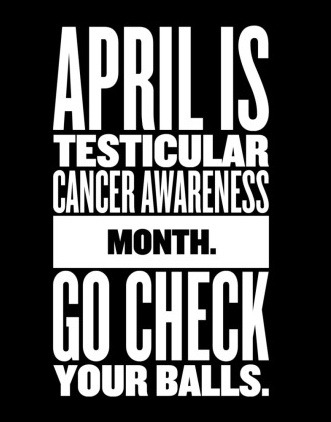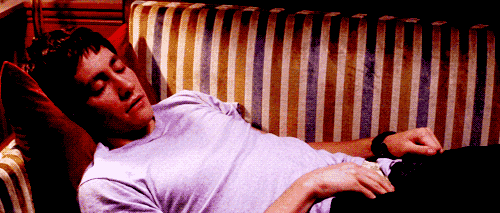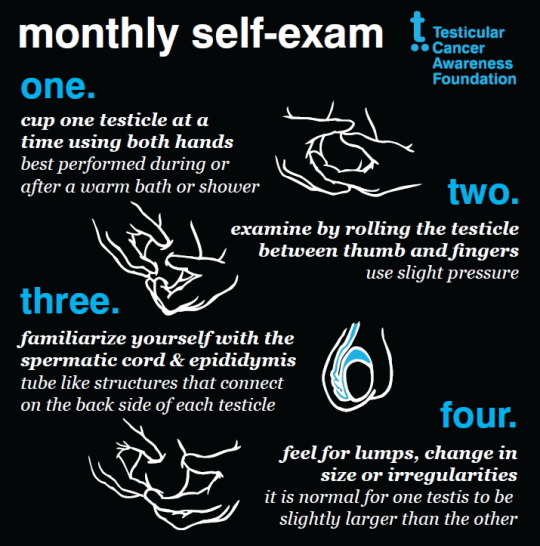
If you have Testicles
You are at risk for
TESTICULAR CANCER
You’d be Nuts NOT to Check ’em!
All males between the ages of 18 and 50 should be performing their own regular monthly testicular cancer examinations.
The highest incidence of testicular cancer is found in Men in their mid 20's to mid 30's. Caught early, a full cure is in your favor
Check in the shower.
While watching TV

Statistics from the National Cancer Institute provide that in 2014, there were 8,820 diagnosed new cases of Testicular Cancer, and 380 deaths in the U.S.

Testicular Cancer
Causes and Treatment
Undescended testicles (Cryptorchidism)
The testes usually descend into the scrotum before birth, while the fetus develops. Men with undescended testicles face a greater risk of developing testicular cancer than those whose testicles descended normally. Furthermore, these males continue to face the higher risks even after they have surgically relocated their testicles.
Family History
If a family member such as your father or brother have been diagnosed with testicular cancer, you may have an increased risk of developing testicular cancer.
Age
Males between the ages 20 to 40 have the highest risk of developing testicular cancer.
History of Testicular Cancer
A previous occurrence of testicular cancer may increase the risk of developing testicular cancer.
Ethnicity
Caucasian men are more prone to developing testicular cancer than men of other ethnicities.
Abnormal Testicular Development
Conditions such as Klinefelter’s Syndrome, which occurs when males have an extra X chromosome, may cause the testicles to develop abnormally. This may increase the risk of testicular cancer.
HIV
Men with Human Immunodeficiency Virus (HIV) infection or Acquired Immune Deficiency System (AIDS) may have a highest risk of developing testicular cancer.
Treatment for Testicular Cancer
Testicular cancer is high curable if diagnosed and treated early. Below are some of the forms of treatment doctors may suggest to treat testicular cancer:
Surgical Removal of Testicles (Orchiectomy)
Orchiectomy is the primary treatment of testicular cancer. Under a general anesthetic, the surgeon will make an incision in your groin and remove the entire testicle. Arrangements can be made with the surgeon to insert an implant in the area.Surgical Removal of Lymph Nodes (Lymphadenectomy)
Lymphadenectomy may or may not be performed. Under a general anesthetic, the surgeon will make an incision in your abdomen to remove the lymph node. However, there is a risk of nerve damage.
Radiation Therapy
Radiation therapy uses high-powered energy beams to kill the cancer cells. There are two types of radiation therapy:
External Radiation: a large machine sends radiation toward the target organ
Internal Radiation: a radioactive substance sealed within a small object like a seed, ribbon or wire is planted directly around the cancer
Radiation therapy is mainly used for patients with seminoma. It is also sometimes used after a surgery to remove the residual cancer cells.
Chemotherapy
Chemotherapy makes use of the drugs to kill the cells, or stop them from dividing. It may be recommended after a surgery to remove the residual cancer cells. However, there are various side effects to chemotherapy, which include:
- Infertility
- Fatigue
- Nausea
- Hair Loss
- Depression
- Increased risk of infections
Testicular Self-Exam (TSE)
Testicular cancer is highly curable, with about 95% of patients surviving within five years after diagnosis. However, this only applies if the cancer is detected early. Many patients fail to seek treatment before it spreads to other parts of their bodies.Thus, it is highly recommended to conduct monthly testicular self-examinations to check for any possible signs and symptoms and diagnose your condition early.
Below is a step-by-step guide to conduct the self-examination:
- Conduct the TSE in a warm shower, as this relaxes your scrotum
- Stand in front of a mirror and look for any swelling on the scrotal skin
- Cup one testicle using your index and middle finger
- Gently roll the testicle between the thumb and the fingers and look for any lumps or abnormalities
It is normal for one testicle to be slightly larger than the other
There is a cord-like structure at the back of the testicle (epididymis) which transports sperm, which should not be mistaken as an abnormality
If you notice any lumps or abnormalities, you should fix an appointment with a doctor as soon as possible.



2 comments:
Everyone here i think would have gotten a piece of their share from cancer, with some being able to survive and others dying even with the high efforts of oncologists. I had lungs cancer due to the fact that i was a hardcore smoker Due to the terrain in Alaska. I started to have symptoms in 2008 and i was diagnosed in April 2009. Several therapies of treatment were prescribed but none seemed to help me. I had just less than a year to live. Less than 6 months to go i read about Doctor Roland who is a herbal doctor that treats cancer. At first i doubted because my case was chronic and even if he could help it was already late. I had nothing to lose so i contacted him and he was very encouraging even in my condition and i placed an order for the herbal medicine which i used for 3 months. Even before i was done using it i felt strong and after it all i went for diagnosis and i tested negative. This is a permanent cure because it's been three years from my supposed death and i am still very strong and alive. Do not give up soon on yourself just reach him on (dr.rolandoscar@gmail.com) i am positive that if i can be cured you too can. I pray for all cancer patients worldwide.
Thanks for your information. Please accept my comments to still connect with your blog. And we can exchange backlinks if you need. What Is Testicular Cancer?
Post a Comment